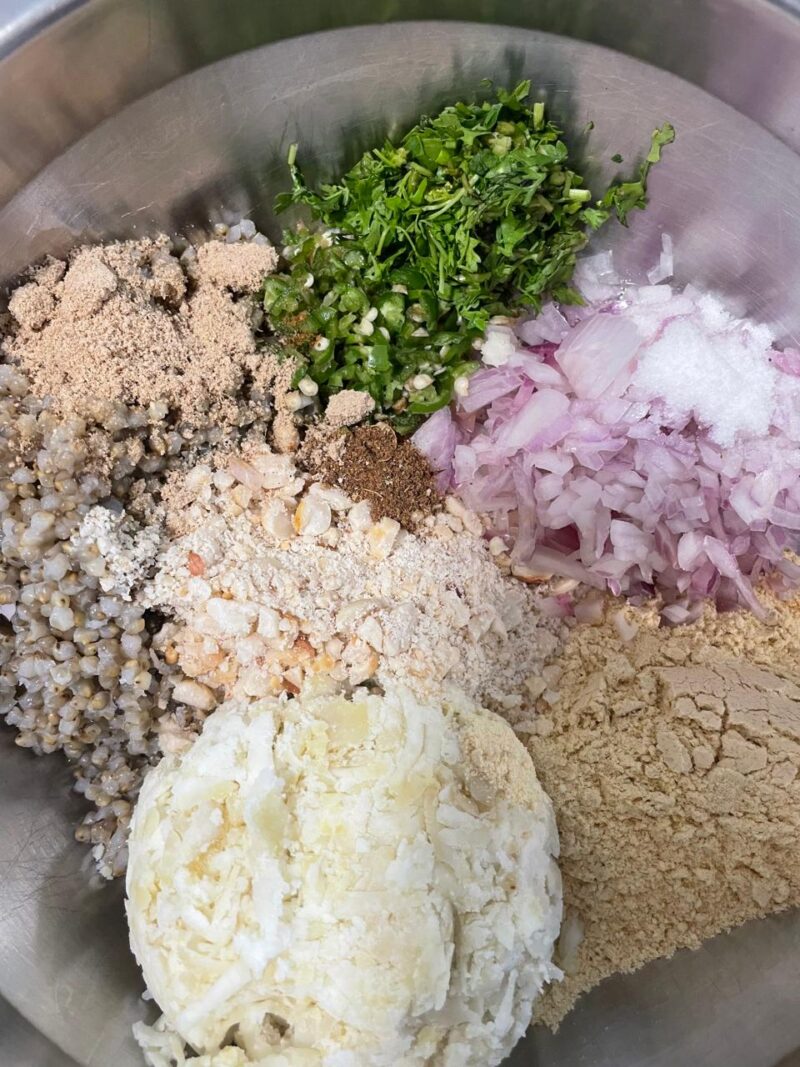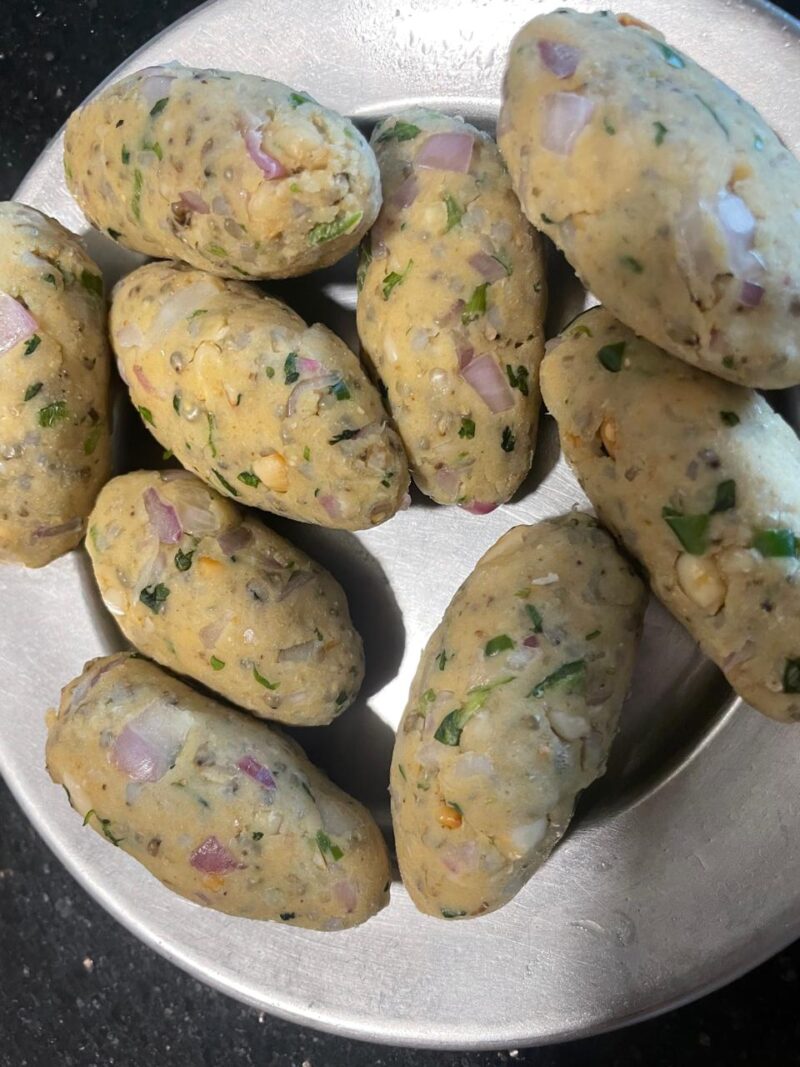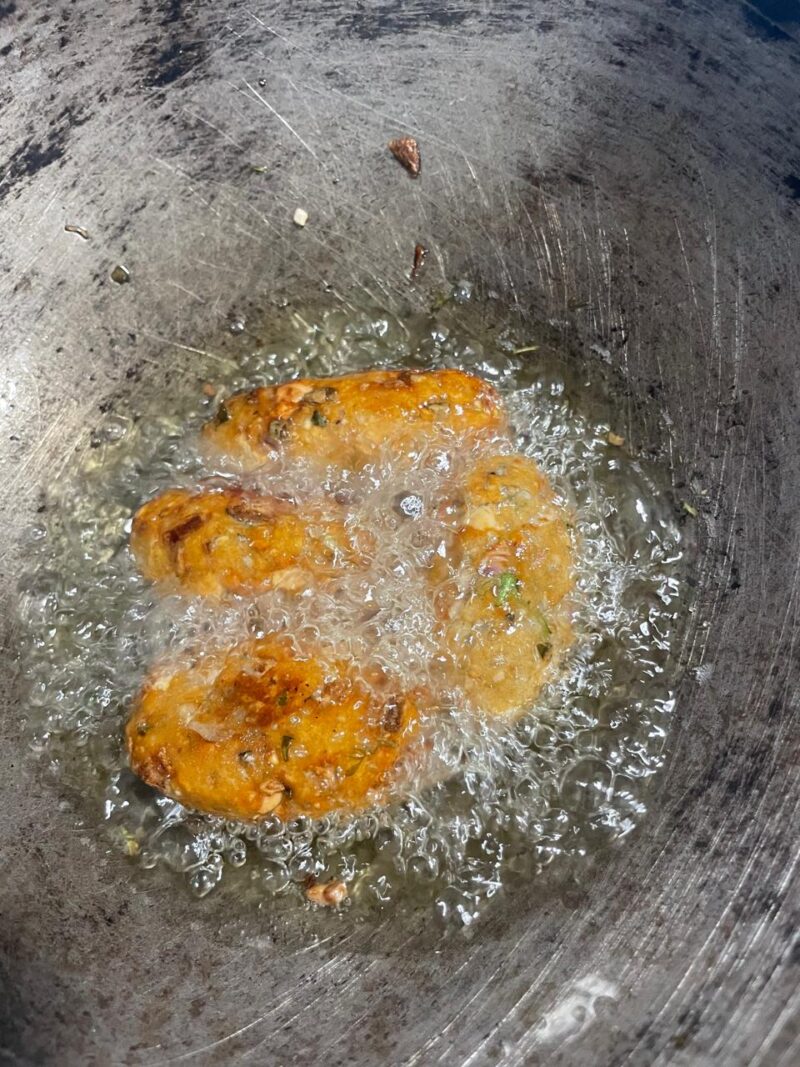
For the Cutlets:
| Bajra (pearl millet), whole, soaked | ¼ cup or 60 grams approx. |
|---|---|
| Water | ½ cup or 120 ml approx. |
| Sweet potato, diced | 1 ½ cup or 200 grams approx. |
| Peanuts | ½ cup or 65 grams approx. |
| Garam masala | 1 teaspoon |
| Besan | ½ cup or 45 grams approx. |
| Onion, finely chopped | ½ cup or 75 grams approx. |
| Green chillies, chopped | 2 |
| Amchur powder | ½ teaspoon |
| Cumin powder | ¼ teaspoon |
| Coriander leaves, chopped | 1 tablespoon |
| Salt | to taste |
| Oil or ghee | ½ cup |
For the Garam Masala:
| Black cardamom | 1 pod |
|---|---|
| Cloves | 8 |
| Poppy seeds | 1 tablespoon |
| Black peppercorns, whole | 8 |
| Cinnamon | a 1-inch stick |
| Mace | ½ blade |
| Green cardamom | 4 pods |
| Dry Kashmiri chilies, whole | 1 |
| Nutmeg, grated | ¼ teaspoon |
What You Will Need
A pressure cooker, a mixer grinder, a mixing bowl, a kadhai or deep-bottom pan, measuring spoons, measuring cups, a masher, a slotted spoon, a strainer, and a spatula.
Instructions
Wash the bajra grains and soak them overnight. The next morning, rinse and strain the grains, then discard the water.
Place the pressure cooker on the stovetop on a medium-high flame, and add the soaked bajra to it along with water and a pinch of salt.
After one whistle, reduce the flame to low, and continue to cook the bajra for 10 to 13 minutes. Turn off the flame and let the pressure release naturally. The grains should be well cooked and soft. Set the cooked bajra aside.
Clean the sweet potatoes well under running water.
Place a pot on the stovetop on medium-high heat with enough water to cover the sweet potatoes.
Boil the sweet potatoes until they are tender and a fork goes clean through.
Peel the sweet potatoes and mash them well while they are still hot. Set aside.
Place a pan on the stovetop on low heat, and dry-roast the peanuts. Once they are toasted, remove from heat and crush them. Set aside.
You will need one teaspoon of garam masala powder in this recipe. To make the garam masala powder, dry-roast the listed spices in the pan for about a minute, until lightly aromatic. Remove the roasted spices from the pan and let them cool down to room temperature. Grind the roasted spices in a mixer grinder until you get a fine powder.
In the same pan, roast the besan until it is fragrant. Set aside.
Place the cooked bajra, mashed sweet potato, onion, coriander leaves, crushed peanuts, besan, green chillies, cumin powder, amchur powder, garam masala powder, and salt in a mixing bowl.

Mix all the ingredients together until they are well combined.
Shape the mixture into oval cutlets, each about the size that fits inside a closed fist.

Place a kadhai on the stovetop on medium-high heat. Add oil or ghee.
Once the oil is hot, deep-fry the cutlets until they are crisp, and turn golden-brown on the outside.

Serve the bajra cutlets hot with a chutney or dip of your choice.
Tips:
- Soak the bajra for a minimum of six hours, if you are unable to soak it overnight.
- Store the homemade garam masala in an air-tight container for a longer shelf life.
Variations:
- You can substitute sweet potatoes with potatoes.
- You can add vegetables like grated carrot, cabbage, or cauliflower, boiled green peas, finely chopped capsicum, or freshly chopped methi leaves to the cutlet dough if desired. The quantity of vegetables added should be two tablespoons and not more, since the vegetables will release moisture into the dough. More than two tablespoons might make the dough soggy.
Urvashi Swami is a development professional with a passion for sustainable food. Following her Master’s degree from Tata Institute of Social Sciences (TISS) in Mumbai, she worked in the agriculture and nutrition sectors. Urvashi wants to spread awareness about how climate-resilient and nutritious millets are, and help bridge the gap between millet producers, consumers, and suppliers.
You must be logged in to rate this recipe.

Sign in with email
